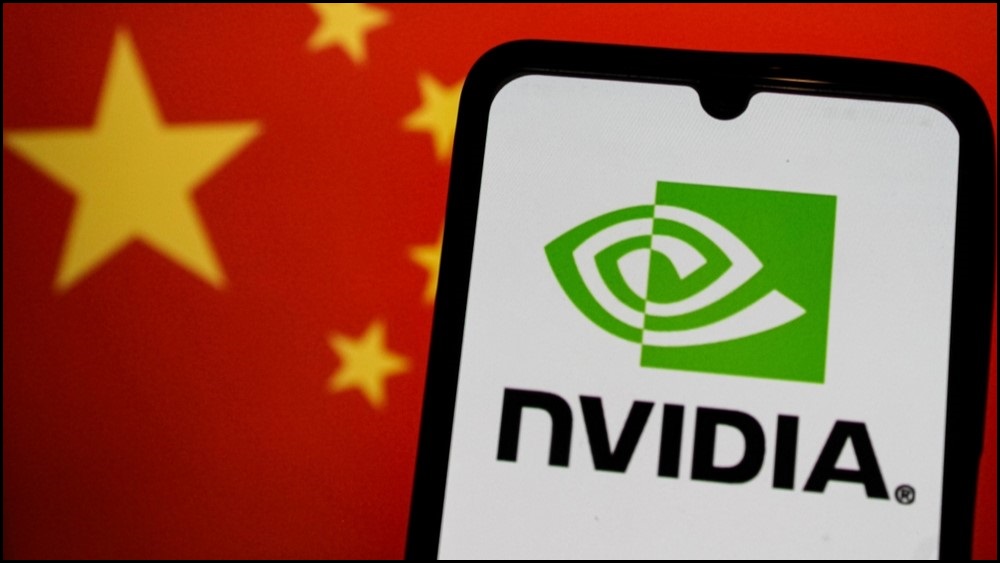
Nvidia can sell its chips to China again, as long it gives the US government a 15 per cent cut. Photo: Shutterstock
Analysts are scratching their heads after the US government – which recently banned Nvidia and AMD from exporting powerful AI chips to China out of national security fears – reversed the decision on the condition that it be paid a 15 per cent share of the companies’ revenues.
The agreement will see Nvidia pay the commission on sales of its H20 chip – exports of which the Trump administration banned in January, but reallowed in July after intense lobbying by Nvidia CEO Jensen Huang secured a promise that sales would be reinstated.
One of his most persuasive arguments was that preventing China from accessing US AI chips would force it to develop its own technologies – potentially marginalising the “US technology stack” that Huang argues should be the worldwide default for AI systems.
“General-purpose, open-source research and foundation models are the backbone of AI innovation,” Huang recently said in arguing that “we believe that every civil model should run best on the US technology stack, encouraging nations worldwide to choose America.”
The argument seems to have won over Trump, who is no stranger to ideological flip-flopping on major policy positions but has, with this move, departed from policy norms that have conventionally prioritised nation security interests over quick financial wins.
The former Biden administration imposed AI chip export bans in 2022, with updated rules in 2024 leading Nvidia to design the H20 chip – which US Commerce Secretary Howard Lutnick called its “fourth best” CPU – as an alternative that was compliant with the export controls.
H20 chip sales generated up to $23 billion ($US15 billion) last year but Nvidia said in April that the restrictions on its sales – accelerated by revelations of its use by disruptive Chinese AI firm DeepSeek – had cost it $8.4 billion ($US5.5 billion) in quarterly revenues.
Is national security policy now for sale?
Strict US export controls were designed to “advance national security, foreign policy, and economic objectives” including “promoting continued US strategic technology leadership”.
The government has outwardly maintained the importance of those controls, with US authorities last week charging two Chinese nationals for illegally exporting tens of millions of dollars’ worth of AI chips to China at least 21 times between October 2022 and July 2025.
While the new arrangements could net the US government billions annually in a quid pro quo for relaxing export controls, Nvidia – which recently became the first company to ever reach a $6 trillion ($US4 trillion) valuation – stands to gain billions more in Chinese sales.
Yet despite its promise of a financial windfall for the US, the move has drawn condemnation from lawmakers and analysts who fear Trump is shelving long-held principles of national security for a quick buck – and progress on US-China negotiations over rare earths metals.
Yet some question whether the move is even legal – the US Constitution bans Congress from levying taxes on exported products – with University of San Diego California professor Kyle Handley telling Yahoo “it looks a lot like the government is skimming a little bit off the top.”
The move has sent shock waves through the business community, with suggestions that profit-minded public companies could be increasingly expected to give the US Government a take for favourable regulatory treatment.
The US government “bent national security a bit,” Pangaea Policy founder Terry Haines said. “They think they didn’t break it, but they are taking a piece out the door here – which certainly doesn’t pass the smell test.”
Yet in a broader sense “this isn’t really good for tech no matter how it slices,” Haines said, adding that “you’re seeing tech humbled” and that “there’s going to be a lot of negative backwash based on the concerns that this sort of strategy might spread.”
China pushes back
Whatever the financial and policy implications of the Nvidia deal – which will also affect rival US chipmaker AMD, which has agreed to similar terms – the company has positioned it as an important step in US domination of an industry that has exploded in scale and significance.
Previous blanket bans on technology exports have only served to motivate Chinese innovators like Huawei – banned by authorities in the UK, Australia, and elsewhere – and Nvidia warned that “America cannot repeat 5G and [loss of] telecommunication leadership.”
Huawei has enjoyed strong success in dominating sales of domestically developed 5G mobile technologies, working around restrictions on key technologies.
As with 5G, Huawei is working to build AI chips to rival those of the American giants and recently claimed it had improved on DeepSeek’s approach to speed AI training – which concerned Biden enough that he tightened export controls in his administration’s last days.
The US has variously banned Chinese software and hardware from cars, isolated and then banned Chinese-owned social media firm TikTok in a move echoed by Australian authorities, warned about security vulnerabilities in Hikvision cameras, and more.
Yet for all the expected revenues that the deal will open for Nvidia, the long-term interest of China – which has previously warned about the security of Tesla products in a backlash against US policy – is far from assured.
Government authorities recently raised fears that the H20 chip had been approved because it contains security backdoors – a suggestion that Nvidia rushed to refute even as Chinese state media called its chips “neither environmentally friendly, nor advanced, nor safe.”
Nvidia, however, remains undeterred: “America’s AI tech stack,” it said, “can be the world’s standard if we race.”

